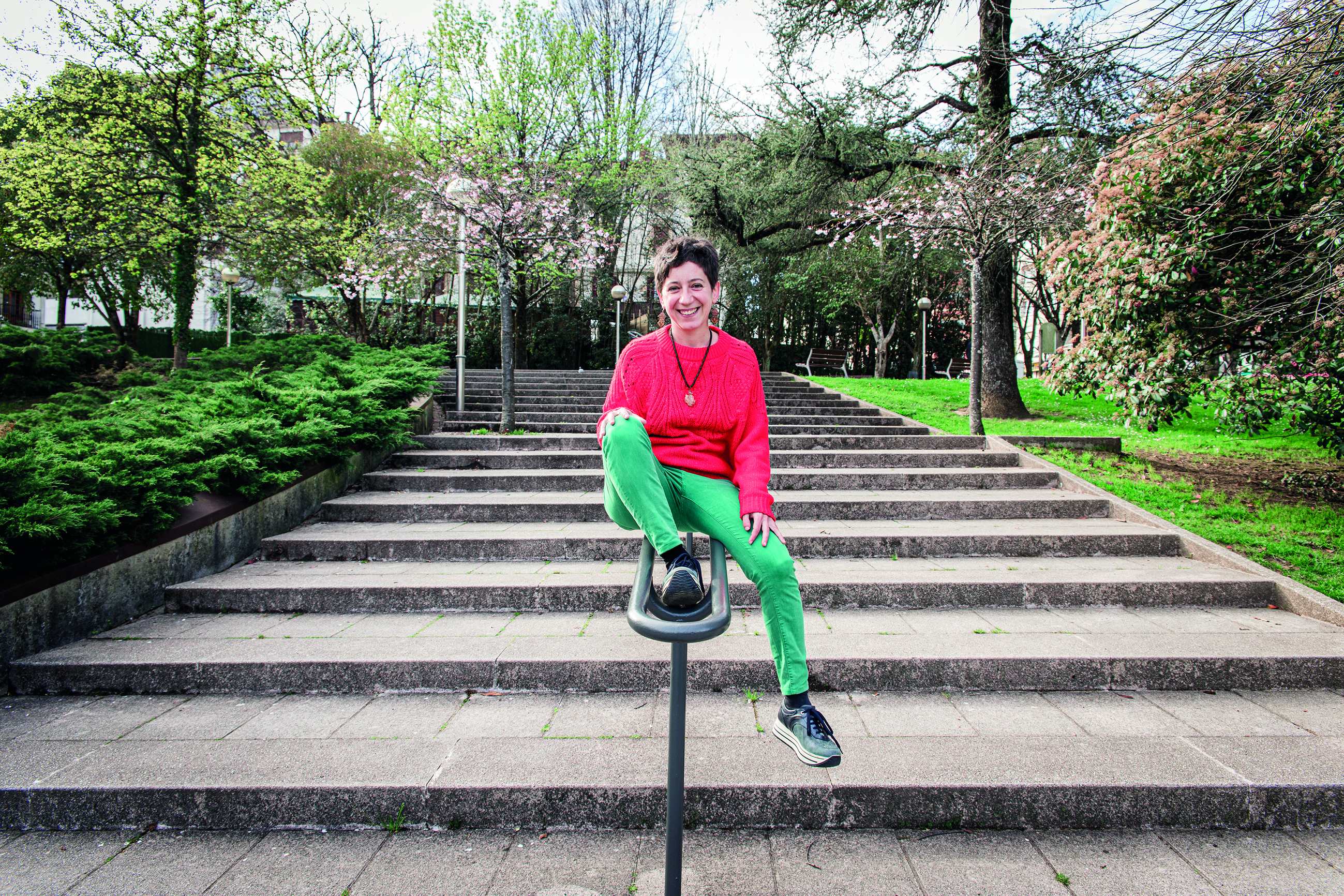Attention to body and life
- “Putting life in the center.” There is more and more a phrase that summarizes many of the demands of the feminist economy. But what exactly do we talk about when we repeat that motto? How do you bring this approach to projects or companies? In search of answers we have come to five people who know the benefits and hangover of this effort.

I've already done the test. I've asked friends and acquaintances about the feminist economy. Many have invented talking about something that has to do with: “To become aware of the value and importance of care”, “to give more importance to well-being than to performance”, “to take care of relationships and personal needs”… However, to the question of whether they know the projects that have led to the implementation of these broad ideas, no one has been able to give a name. There are, however, those who are trying to recognize them and bring them to their daily lives. Despite the difficulties.
Errenteria researcher Irati Mogollon knows something about all of this. She has carried out, along with her colleague Ana Fernández Cubero, feminist audits of several cooperatives. After many researches and practices, they have identified certain conflicting areas: time, forms of work, the model of remediation and the degree of collectivization. Through them they perceive the precariousness, the conflicts of conciliation, the relations of power…
Irati Mogollon, researcher:
“Those who suffer from Workoholism live in the name of passion in self-exploitation, tired but happy. They feel guilty of laziness if they take the holidays; in their eagerness to give everything, they make endless days”
She says that it is possible to transfer the perspective of the feminist economy to concrete projects, but to do so it is essential to review the objectives of production taking into account changes in the bodies and in the cycles of life. Otherwise, the tension between two distinct philosophies is fuelled. “For example, it is common to act in the name of conciliation with reduced days. Time reduction must not lead to a reduction in the volume of work. It often means doing the same amount of work in shorter times and wages.”
Workoholism: The Favorite Work Trap
Asked about the difficulties and obstacles to establish the practices that come from this feminist logic, Mogollon has referred to “workholism”. The behavior of those who, believing that they have turned what they like in their work, materialize their identities and aspirations through employment. “In the name of passion, they live in self-exploitation, tired but happy. They feel the guilt of being in laziness if they take the holidays; as they want to do their best, they have endless days; although they earn little money, they hope that someday the situation will change; and in the name of that future stability, they work continuously”. Mogollon, despite its generalization, considers a problem that cannot be ruled out. On the one hand, there are privileged sectors that benefit from this work model or logic. On the other hand, because they put life at the service of the productive process, rather than putting it at the center.
It has also identified other obstacles such as hyper-stimulation or the need to do something continuously, and the conflict of remuneration. “Asking for money for the work we have done gives us great reticence or contradiction, even more so our intangible work denean.Askotan, the source of that guilt is the fear of becoming aware of our political activity and turning activism into a trade. But we have to learn how to set limits on the remuneration account. Only with the recognition and gratitude of the community, at the moment you cannot buy the bread or pay the water bill.
The importance of sharing emotions
The Ttipi Studio cooperative is one of the projects most known by Irati Mogollon. They work in the collaborative design of collective spaces and in the collaborative processes of communities and institutions. According to Maddi Texeiro, a member of the association, some of the ideas of the feminist economy have been transferred to their organization and to their relations. He says that they realize the importance of all types of work and functions and that they all have the same value, both in care and in pay. “We also know well the way of personal life and its reality outside of work, we talk a lot about it and value it in everyday group attitudes and dynamics”.
A similar path has been made in the Kalaka communication agency of the capital of Alavesa. They attach great importance to sharing their emotions, aware of the influence this has on daily relationships. Flexible working hours have also allowed them to “put life in the center”: “We are very happy every day to work, and it is a solid path for our realization, but our life is more than work. That is why we organise working hours within the framework of our lives. Conciliation, training, diseases and slow days have their place in the working day”. Texeiro, for his part, believes that flexible hours can be a trap. “It is difficult to differentiate between employment, leisure and care time, and they often walk each other. Needless to say, if social media and e-mails keep us constantly connected.”
The role of the Administration
Nerea Fillle, partner and worker of the Katakrak bookstore, has a very different view. It does not believe that there are projects capable of focusing on the feminist economy, not even yours. “At Katakrak we are trying to respect rights that should be indispensable, but those are the rights. We should all comply with them.” In any case, he acknowledges that there are decisions made from the point of view of their well-being rather than the benefit: despite being a bar and cantina, they do not open on Sundays and holidays, and they extend paternity or maternity leave for another two weeks.
Maddi Texeiro, Ttipi Studio:
“We are well aware of the personal way of life and its reality outside work, we talk a lot about it and value it in everyday group attitudes and dynamics”
He says that these small decisions are very important, but that in order for the feminist economy to become a real axis, the administration must also have an active role. “Until the issue is addressed by the Administration, it will be very difficult to propose transformative changes.” In this sense, he claims that, on the one hand, in cooperatives, as in other legal structures, the full contribution to the enjoyment of the reduction of the day for care is maintained. On the other hand, the equalization and compulsory nature of paternity and maternity leave. “In this way, we would suddenly soften discrimination in hiring and force men to perform care tasks.”
Hurry is not a good companion
The feminist economy can demand a review of schedules and ways of relating, but not only that. The pace and cycle of projects need, at least, a half return. A good example is the Navarros in Lastota. It has been five years since the Coexistence Laboratory was set up in the Region of Pamplona, bringing together agriculture and training. They have not yet succeeded, but they are getting closer. “We’ve understood that if it hasn’t come out so far, it’s because we had to learn a lot. That has helped us not to fall into frustration and despair. We haven't lost the north, although we've had a lot of candy or temptations. We have chosen to delay the economic benefit in order to maintain the right path. In addition to mutual care, the care of our project has also been important. In order to maintain the philosophy of the project and not to lay the foundations of it, we have given up getting salaries sooner”.
It seems that it is only in the hands of the youngest to go through these types of roads, it is becoming more and more difficult as the years and responsibilities accumulate. This belief has been revolutionized in Lastotan. Nerea Esparza, for example, is 41 years old and two children, and keeps with joy and enthusiasm his intention to create Lastotan. "Our life has not exploded. We’ve had crises, but we’ve looked after each other and, being clear about what our dream is, we’ve faced.” They're the first experiment of what will be a living lab, and they're proud to have done the road as slow as they are firm. “Everything we have learned in this way, taking care of each other, respecting our rhythms of life and overcoming the obstacles, will also serve us later.” The passage of time and lack of haste has enabled them to take good care of their behaviour, and instead of weakening them, has reinforced them.
Ekonomia feminista izan dugu gaur hizpide Lanaren Ekonomia saioan, Bilbo Hiria, El Salto Radio, ARGIA eta Hordagon arteko elkarlanean.
The same question is provocative. This person who has studied accounting rigidly (I) felt like knowing nothing more than hearing the question. The presentation of the Final Degree Study carried out by a student from the Faculty of Economics and Business of San Sebastián allowed... [+]
As of January 2021, when a child is born in Spain, each parent has sixteen weeks of work leave, of the same length and non-transferable. However, since November 2019, the Basque Government has made authorisations equal by means of a grant. It is presented as a measure in favour... [+]
Pandemiari aurre egiten jarraitzeko, gure erronka nagusia izan behar da bizitza zaintzen duten eremu eta jarduerak indartzea, ondorio sozial latzak borrokatzeko.
Evidence of the gender gap in wage and labor has reached a certain media and social presence in recent times. According to the INE (National Statistical Institute), almost three-quarters of temporary contracts are held by women in the Spanish State. Also, the data provided by... [+]

























